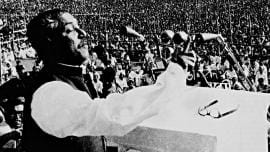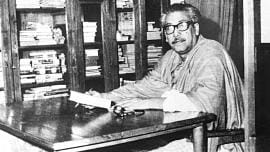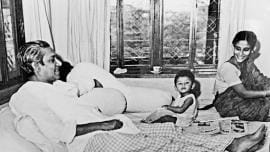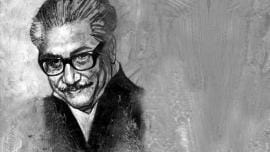Opinion / What makes the 7th March speech one of the best?
7 March 2021, 13:37 PM
Bangladesh
From the archives / Sheikh Mujib: The evolution of a great leader
15 August 2017, 08:23 AM
Supplements
Interview with The Daily Star, 1992 / In the shadow of a larger-than-life father
14 August 2017, 18:00 PM
Editor's Pick
From the archives / Towards a Consensus on Honouring Bangabandhu
14 August 2017, 18:00 PM
Supplements
Extracts from editorials in 1993, ’94 and ’95 on Bangabandhu's murder
14 August 2017, 18:00 PM
Supplements
Sheikh Mujib: The evolution of a great leader
“My people love me,” is an oft-quoted remark of Bangabandhu Sheikh Mujibur Rahman. In foreign press reports, the claim is sometimes treated with a touch of sneer, which is unfortunate, because the Sheikh says this in all sincerity and apparently derives his real strength as a leader from this “love of my people.”
15 August 2017, 08:23 AM
In the shadow of a larger-than-life father
Interview with The Daily Star, 1992: On the occasion of Bangabandhu's 17th death anniversary, Sheikh Hasina talked to The Daily Star frankly about her childhood, about the way she learnt her politics and the lasting influence that her father, and crucially, her mother left on her
14 August 2017, 18:00 PM
Towards a Consensus on Honouring Bangabandhu
Nations fall into deadly intellectual traps – and we seem to have a special knack for doing so at regular intervals – when they try to judge historical events in accordance with the political convenience of the present. The memory of Bangabandhu is a classic example of how a national hero becomes a victim of politicisation of history.
14 August 2017, 18:00 PM
Extracts from editorials in 1993, ’94 and ’95 on Bangabandhu's murder
Since 1993, we had taken the editorial position that August 15 should be declared as the National Mourning Day and be observed officially as such. This position The Daily Star took when BNP was in power, as a continuum of the regimes of Gen. Ziaur Rahman, Gen. Ershad and that of Khaleda Zia. Ours was a bold and principled position against the political current of the day.
14 August 2017, 18:00 PM






